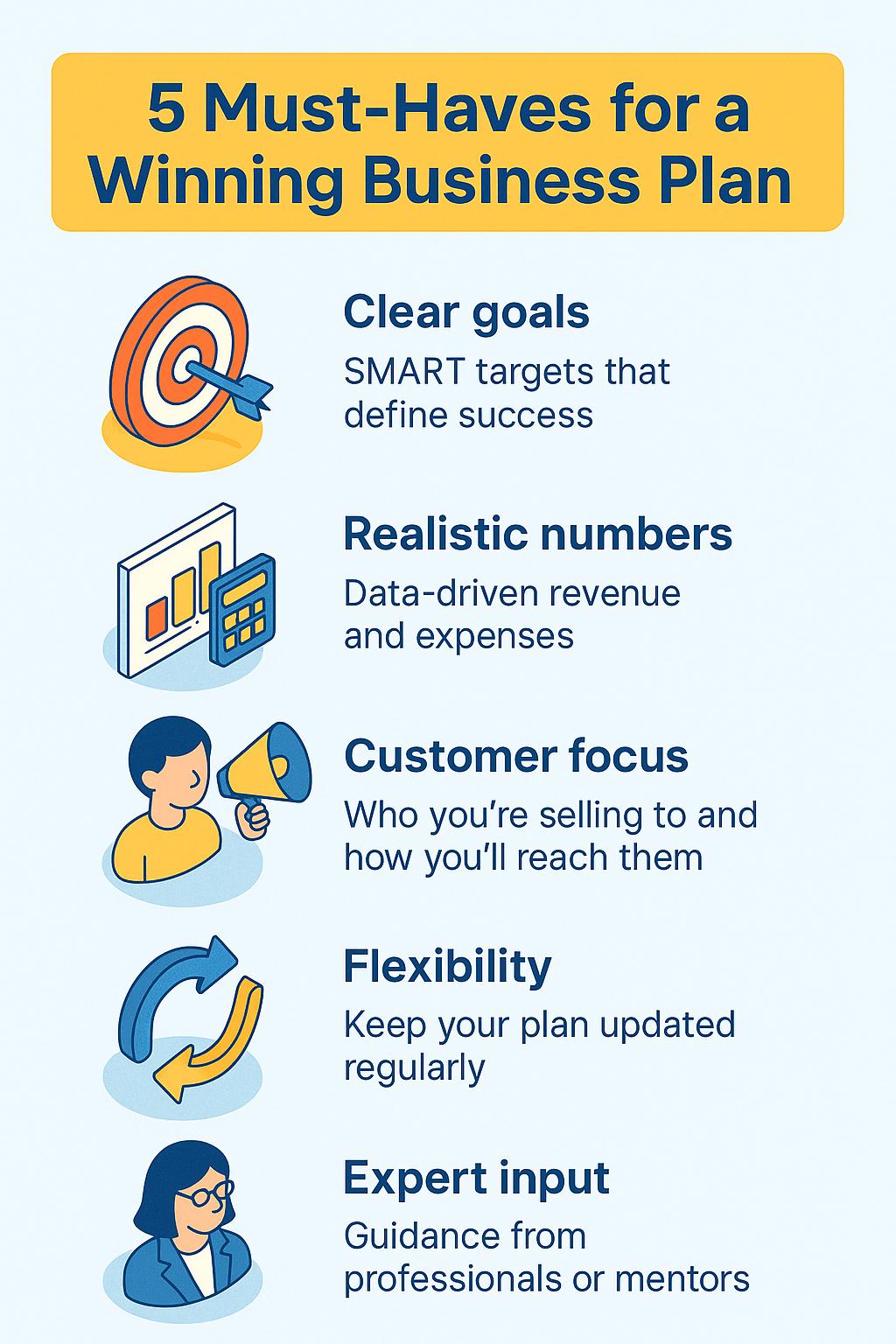Starting a small business is exciting—you’ve got the idea, the drive, and the vision. But before you dive in, you need more than enthusiasm. You need a business plan that works.
The challenge? Many entrepreneurs make the same costly mistakes when creating one. They set vague goals, overestimate revenue, underestimate expenses, or skip marketing altogether. These business plan errors don’t just slow you down—they can sink your progress before you even get started.
In this guide, we’ll break down the 10 most common small business plan mistakes and show you how to avoid them so you can set your business up for real, lasting success.
Mistake #1: Not defining clear goals
A vague goal like “I want my business to succeed” doesn’t help you track progress. Success could mean revenue, customer growth, or expansion—without clarity, you’ll never know if you’re moving forward.
Fix it: Set SMART goals (specific, measurable, achievable, relevant, time-bound). For example: “Sign 50 new customers in the next three months.” This gives your business plan focus and direction.
Mistake #2: Ignoring market research
Many entrepreneurs skip market research and rush into selling. Without understanding your target market or competitors, you risk mispricing, poor messaging, or building something people don’t really need.
Fix it: Do basic research. Know your target audience, study competitor strategies, and identify gaps where your business can stand out. A data-backed business plan is always stronger.
Mistake #3: Overestimating revenue
It’s easy to imagine big profits in your first year, but unrealistic sales projections are one of the most common business plan errors. If your numbers aren’t based on data, you could end up overspending or making risky decisions.
Fix it: Use conservative, fact-based revenue forecasts. Investors and lenders value realism over optimism in a small business plan.
Mistake #4: Underestimating expenses
Most new business owners list obvious costs like rent or salaries but forget “hidden” expenses—software, packaging, licenses, delivery, and marketing. These small costs add up fast.
Fix it: Build a detailed expense list and include a contingency fund for unexpected bills. A well-prepared financial plan protects your cash flow.
Mistake #5: Skipping financial planning
A strong idea won’t survive without solid financials. Many business plans fail because they don’t cover cash flow, profit margins, or funding sources.
Fix it: Plan how money will move in and out of the business. Outline funding needs, pricing strategy, and expected profits. Solid financial planning shows investors and partners you mean business.
Mistake #6: Ignoring marketing & sales strategy
Even the best product won’t sell itself. Too many small business plans describe the product in detail but barely mention how customers will find it.
Fix it: Add a clear marketing and sales strategy. Will you rely on social media, local ads, partnerships, or word of mouth? Show how you’ll attract and convert customers.
Mistake #7: Copying templates without customization
Templates are useful, but a copy-paste plan won’t impress anyone. Investors, lenders, and even customers want to see what makes your business different.
Fix it: Personalize your plan. Highlight your unique value proposition, market knowledge, and goals. A tailored plan builds trust.
Mistake #8: Not updating the plan regularly
Writing a business plan once and forgetting about it is a mistake. Markets, customer behavior, and competitors change fast.
Fix it: Review and update your plan regularly. A flexible small business plan keeps you aligned with real-world changes.
Mistake #9: Failing to consider risks
Most entrepreneurs focus on opportunities and ignore risks. But risks—supply chain issues, new competitors, or regulations—can hit at any time.
Fix it: Add a simple risk assessment to your business plan. List potential challenges and how you’ll handle them. This shows foresight and resilience.
Mistake #10: Skipping professional guidance
Relying only on your own perspective creates blind spots. A mentor, accountant, or business coach can catch issues you’ve missed and strengthen your business plan.
Fix it: Seek expert input. Even a short consultation can prevent costly mistakes and make your plan more credible.

Conclusion
A business plan can make or break your success. Common mistakes—like unclear goals, poor financial planning, or ignoring marketing—waste time, money, and momentum.
Avoid these pitfalls, and your plan will become a tool that keeps you focused, manages resources wisely, and adapts as your business grows.
Pair your plan with the right digital tools to track performance and stay organized, and you’ll give your small business the strongest chance of long-term success.














